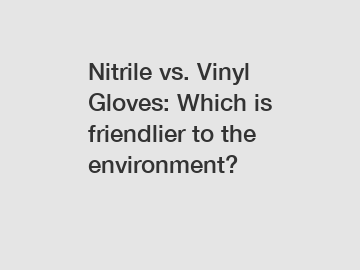Nitrile vs. Vinyl Gloves: Which is friendlier to the environment?
In today's world, where environmental sustainability is becoming an ever more pressing concern, individuals and industries alike are striving to make choices that are friendlier to the planet. From reducing plastic usage to opting for eco-friendly transportation, there are countless ways to contribute to a better future. In this blog, we will delve into the debate of nitrile vs. vinyl gloves and analyze which one is more environmentally friendly.
Nitrile and vinyl gloves are commonly used in various sectors, such as healthcare, food service, and industrial settings. They both serve the purpose of providing a barrier against potential contaminants, ensuring safety and hygiene. However, their composition and environmental impact differ significantly.
Let's start by examining nitrile gloves. Nitrile is a synthetic rubber that is derived from petroleum. Unlike latex gloves, nitrile gloves do not trigger latex allergies in individuals, making them a popular alternative. One significant aspect of nitrile gloves is their durability and resistance to punctures, making them ideal for tasks that require high levels of manual dexterity and protection.

While nitrile gloves offer excellent protection, their production process involves the use of fossil fuels, which contribute to carbon emissions and climate change. Additionally, the process of extracting and refining petroleum raises concerns about habitat destruction and pollution. However, it's worth noting that some manufacturers are adopting more sustainable practices, such as using biodegradable additives in their nitrile gloves to enhance their eco-friendliness.
On the other hand, vinyl gloves are made from polyvinyl chloride (PVC), a petroleum-based plastic. The manufacturing process for vinyl gloves requires less energy than that of nitrile gloves. However, PVC itself has a relatively significant environmental impact. It is non-biodegradable and releases toxic chemicals when incinerated, posing a threat to both human health and the environment.
Moreover, PVC production involves the use of phthalates, a group of chemicals that are added to enhance the flexibility of the plastic. Phthalates have been linked to health issues such as hormonal disruptions and reproductive problems. These factors contribute to the growing concern about the environmental and health consequences of using vinyl gloves.
Considering these points, it becomes clear that both nitrile and vinyl gloves have their own environmental drawbacks. So, what can we do to minimize our impact?
One way to address this issue is by encouraging the use of more sustainable alternatives. For instance, some manufacturers are now producing gloves made from plant-based materials like cornstarch, which significantly reduces reliance on fossil fuels. These gloves are often labeled as "biodegradable" or "compostable," highlighting their low environmental impact.
Another approach is to promote the responsible disposal of gloves. Recycling and reusing gloves, whenever possible, can significantly reduce the amount of waste sent to landfills. Additionally, opting for gloves with reduced packaging – or packaging made from recycled materials – can help combat the issue of excess waste.
In conclusion, while nitrile and vinyl gloves are commonly used for their protective qualities, they do come with environmental concerns. Nitrile gloves, although durable and resistant, contribute to carbon emissions through their petroleum-based production process. On the other hand, vinyl gloves, while less energy-intensive to manufacture, pose hazards due to the non-biodegradable nature of PVC and the use of phthalates.
To make a more environmentally conscious choice, it is essential to explore alternatives to these commonly used gloves. Choosing gloves made from sustainable materials or labeled as biodegradable or compostable offers a promising path towards reducing our impact on the environment. It is also crucial to promote responsible disposal methods and recycling efforts to minimize waste and preserve our planet for future generations.
Remember, every action counts, and by making informed choices, we can contribute to a greener and more sustainable future.
If you are looking for more details, kindly visit White Nitrile Exam Disposable Glove, Vinyl Medical Gloves China supplier, 4.5g Blue Disposable Nitrile Gloves for sale.
127
0
0


Comments
All Comments (0)